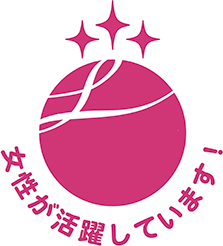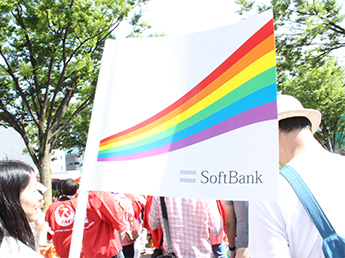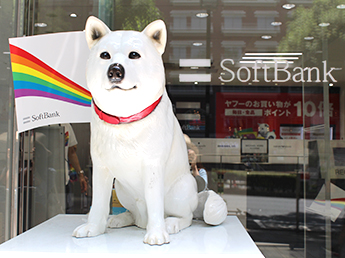Promotion of Diversity


Message from the CEO
SoftBank aims to be the business group which is most needed by the people of the world and will continue to take on challenges and evolve to become a “comprehensive digital platformer.” One of the driving forces behind that goal is the creation of a management foundation upon which diverse personnel can play an active role. It is essential that we eliminate barriers due to age, gender, sexual orientation, gender identity, gender expression, nationality, and disability, and it is extremely important that we ensure diversity within the core personnel involved in management.
I have positioned diversity as an important business challenge and will initially focus the spotlight on supporting women in the workforce and establish a Committee for the Promotion of Women in the Workforce including expert advisors. In order to create a corporate culture in which diverse personnel can play an active role, I hope to actively promote Diversity, Equality and Inclusion to make SoftBank into a vibrant and uplifting company.
June 2021
President & CEO, SoftBank Corp.
Junichi Miyagawa
Creating a strong organization by combining the capabilities
of diverse individuals
SoftBank Corp. strives to create opportunities and build an environment in which all employees, regardless of age, gender, sexual orientation, gender identity, gender expression, nationality or disability, can demonstrate their individuality and capabilities. Promotions are given based on fair evaluation of responsibilities, performance and capabilities.
Employees are united with a common vision, able to leverage each other's strengths, communicate freely and pursue innovation in their efforts toward realizing the corporate philosophy.
When it comes to promoting internal diversity, we face the issues in each organization and implement programs centered around the full-time Diversity Promotion Section within the Human Resources Division such as unconscious bias e-learning for all employees and diversity management training for managers.
Supporting women
in the workforce
As of April 2024, women accounted for about 27.0% of all employees at SoftBank with 9.2% of managerial positions held by women. More than 90% of female employees who take maternity or childcare leave return to work. The average length of service is 14.1 years for men and 14.0 years for women, which is only a slight difference. Many female employees are able to balance both their work and childcare responsibilities.
Furthermore, to see even greater utilization of women in the workforce, SoftBank is improving and expanding its system of childcare leave and reduced working hours beyond what is stipulated in the Child Care and Family Care Leave Act. In addition to creating a work environment that enables mothers to have and raise children with peace of mind, SoftBank offers special childbirth allowances, childcare support and other unique career support systems so female employees can reach their full potential.
Specifically, career training and leadership training is provided for female employees and support the building of employee communities on an ongoing basis. From 2018, a mentoring program run by internal managers was started to support various forms of career development for women to play a greater role within the company. In addition, we have announced a goal of increasing the percentage of managerial positions held by women to 20% by FY2035 and established a “Committee for the Promotion of Women in the Workforce” consisting of the CEO, officers, and other members from July 1, 2021. This numerical target represents roughly three times the rate of managerial positions held by women in FY2021 (approximately 7.1%) and will exceed 15% (double the rate in FY2021) in 2030 during this process.
Committee for the Promotion of Women in the Workforce

Ratio of women in managerial positions
| Items | Apr. 2019 | Apr. 2020 | Apr. 2021 | Apr. 2022 | Apr. 2023 | Apr. 2024 |
|---|---|---|---|---|---|---|
| Number of women in managerial positions | 272 | 300 | 338 | 378 | 444 | 496 |
| Ratio of women in managerial positions | 6.2% | 6.6% | 7.1% | 7.6% | 8.6% | 9.2% |
Efforts to eliminate
the gender pay gap
The grade of all employees is determined according to the mission that they are responsible for and their work style rather than their age, gender, or other personal factors, and we have introduced a compensation system that rewards work performance in order to strive to pay fair wages regardless of gender and to eliminate the gender pay gap. In order to assess the actual conditions under such a policy, we conduct a comparison once a year of the average amount of the “monthly salary” and the “monthly salary and bonus” which covers permanent employees and non-permanent employees globally. While the same salary system is being applied to men and women, differences in total compensation are occurring as a result of the current grade structure. In light of this situation, we are taking various measures to promote the activities of women in the Workforce.
Results of pay gap
| Wages of women when men's wages are 100% | ||||
|---|---|---|---|---|
| FY2021 | FY2022 | FY2023 | ||
| All employee | Monthy salary | 76.80% | 77.40% | 77.90% |
| Monthy salary + bonus | 75.20% | 75.70% | 76.10% | |
| Permanent employee | Monthy salary | 77.00% | 77.50% | 78.00% |
| Monthy salary + bonus | 76.30% | 76.60% | 76.80% | |
| Non-permanent employee | Monthy salary | 88.70% | 88.00% | 86.30% |
| Monthy salary + bonus | 86.30% | 84.50% | 83.10% | |
- [Note]
-
- *
The same salary system is applied to men and women. The difference is due to the grade structure.
- *
Efforts to improve women's health issues
We believe that it is important for the entire company, including not only women but also men, to acquire health literacy about women's health issues and to care about women's health in order to support women in the workforce.
We have put in place a variety of systems and environments for early detection of women's health issues and support for poor physical condition so that every employee can work in good health.
Eruboshi certification

SoftBank received “Eruboshi” certification (class 3) by the Japanese government, in recognition of the company's superior accomplishments in initiatives to promote women's advancement in the workplace.
Hiring people
with special needs
As of June 2023, the hiring rate of employees with special needs is 2.74% of all employees working in Japan and overseas. At SoftBank Corp., we want each employee to utilize their respective abilities to play an active role in the company. As a general principle, SoftBank applies the same criteria in the employment of people with special needs as non-disabled persons, and while consideration is given to an employee's disability, once employed, scope of work, promotion, and evaluation standards are identical to those of non-disabled employees. We aim to create an environment in which everyone can work in a lively manner regardless of any special needs.
Support for LGBTQ employees

Our aim at SoftBank is to maintain a working environment in which all employees, regardless of their sexual orientation, can feel proud of and rewarded by the work they do.
In October 2016, SoftBank amended its internal rules to recognize same-sex partners as spouses in line with the definition defined in its internal documentation, in addition to spouses recognized under Japanese law. If the relevant documentation is submitted and processed, same-sex partners are eligible to receive spousal benefits equal to those of other married couples. SoftBank has also set up an LGBTQ-related consultation desk at its Wellness Center in combination with HR consultation services.
In the preface to internal rules on respecting human rights and the forbidding of discriminatory behavior, SoftBank added clauses related to mutual respect regardless of gender, sexual orientation, gender identity and gender expression, making it clear that discrimination on the grounds of sexual orientation is strictly forbidden. SoftBank is also promoting LGBTQ awareness at training sessions for newly appointed managers and through e-learning training for all employees. SoftBank will continue to strive to develop a workplace environment where all kinds of employees can fully realize their potential and take on challenges to grow with the goal of enabling the success of a more diverse group of talented people.
Participating
in Japan's largest LGBTQ event
“Tokyo Rainbow Pride”

SoftBank approves of the mission behind “Tokyo Rainbow Pride” which aims to create a society in which LGBTQ and other sexual minorities can live in a way which is true to themselves without being subject to discrimination or prejudice.
During the event, the SoftBank Omotesando shop located along the parade course decorated its interior with a rainbow theme and handed out limited edition goods such as shopping bags and mask cases since 2018. SoftBank crew members and “Pepper”, the humanoid robot, engaged in awareness activities by wearing original T-shirts.
Awarded the highest “Gold”
rating in the “PRIDE Index”
for seven years in a row

Since 2017, SoftBank has received the highest “Gold” rating in the “PRIDE Index” evaluation for seven years in a row for its internal initiatives for LGBTQ and other sexual minorities.
The “PRIDE Index” is awarded to companies with superior LGBTQ initiatives and was established by the “work with Pride (in Japanese)” voluntary association for the purpose of achieving broad social recognition of specific ways to create comfortable workplaces for LGBTQ and other sexual minorities.
Promotion of the active participation of senior employees
We support the active participation of all employees who are capable and motivated, regardless of their age or sex. In addition to a continued employment system under which employees who desire to continue employment after the mandatory retirement age until they reach age 65 may do so, since FY2021, it has been possible for employees who meet certain criteria to work until age 70. Further, we support a variety of work styles and career formation, through measures such as side jobs and a system under which individuals can set their own work time and number of days.
System / measures
| 50s | |
|---|---|
| Job postings for senior employees | When jobs are posted to recruit employees for new businesses or new companies, we include postings that are aimed particularly at creating new opportunities for senior personnel to play an active role and take the initiative to take on challenges. |
| SoftBank career checkup | We hold age-appropriate seminars, lectures, group training, e-learning, and other such events for individuals in their 20s to 50s as opportunities to review their own abilities and skills periodically, so that they can take a positive step toward their future careers. |
| Second life seminar | These seminars are held as opportunities for full-time employees that are approaching the mandatory retirement age to gain a correct understanding of pensions, medical insurance, and other public pension systems, as well as our continued employment system, and to think about their post-retirement life plans. |
| Senior career change assistance | We support the efforts of employees age 50 and over who have reached a career milestone to take on the challenge of changing to a career outside SoftBank, splitting off independently, or launching their own business, as one of many diverse career options. |
| 60s | |
| Short-time, short-week work | We have also made it possible to utilize work styles other than full-time work (3 to 4 days per week/at least 5 hours of actual work), such as side jobs/concurrent employment through a dual employment system, as one of many diverse work styles, thereby enabling employees to use their time flexibly for activities other than work at SoftBank.
|
| Extended employment past age 65 | If certain criteria are met, individuals may extend employment past age 65, the maximum age for continued employment. |
Number of rehirings of mandatory retirement age retirees
| FY2020 | FY2021 | FY2022 | ||
|---|---|---|---|---|
| Individuals who have reached age 60* | 104 | 156 | 179 | |
| Continuing employees | 98 | 137 | 157 | |
| Mandatory retirement age retirees | 6 | 19 | 22 | |
| Continuing employees age 60 or older | 327 | 413 | 511 | |
| Individuals extending employment past age 65 | 16 | 22 | 33 | |
| Short-time/short-week employees | - | 5 | 6 | |
- [Note]
-
- *Number of individuals newly reaching age 60 in the applicable fiscal year
- *